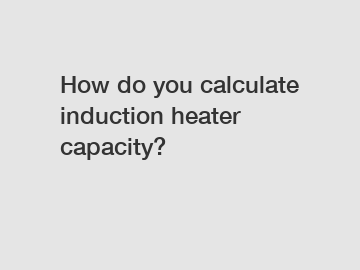Jan. 26, 2024
Machinery
With competitive price and timely delivery, TY-induction sincerely hope to be your supplier and partner.
How do you calculate induction heater capacity?
Induction heating is a widely used technique in various industrial applications, such as metal melting, annealing, and forging. An induction heater, also known as an induction furnace, is a device that utilizes electromagnetic induction to generate heat in electrically conductive materials. Determining the suitable capacity of an induction heater is crucial to ensure efficient operation and meet the heating requirements of the specific application. In this article, we will discuss the factors to consider and the calculations involved in determining the induction heater capacity.

Factors to consider.
Before calculating the capacity of an induction heater, it is important to consider several factors that have a direct impact on the heating process:
1. Material type and volume: The type of material being heated and its volume play a significant role in determining the capacity of the induction heater. Different materials have different heat absorption rates and require varying amounts of energy to achieve the desired temperature.
2. Heating time: The required heating time for a specific application is an important factor in determining the capacity of the induction heater. Longer heating times may require higher power input to ensure the materials reach the desired temperature within the specified time frame.
3. Power supply limitations: The power supply available for the induction heater is another crucial factor to consider. The maximum power input that can be provided by the supply will directly impact the capacity of the induction heater.
Calculating induction heater capacity.
Calculating the capacity of an induction heater involves several steps. Here is a step-by-step guide:
1. Determine the heat energy required: The first step is to calculate the amount of heat energy required to heat the material. This can be done using the formula: Q = mcΔT, where Q represents the required heat energy, m is the mass of the material, c is the specific heat capacity of the material, and ΔT is the desired temperature increase.
2. Determine the heating time: Once the heat energy required is known, the next step is to determine the heating time. This can be obtained through experimental data or by considering the application requirements.
3. Calculate the power required: With the heat energy and heating time known, the power required can be calculated using the formula: P = Q / t, where P represents the power required, Q is the heat energy, and t is the heating time.
4. Consider efficiency: It is important to consider the efficiency of the induction heating system when calculating the capacity. The efficiency accounts for any energy losses during the heating process. Typically, induction heating systems have an efficiency ranging from 60% to 90%.
Once all these steps are completed, the calculated power required represents the capacity of the induction heater required to meet the application's heating needs.
Conclusion.
Calculating the capacity of an induction heater is essential to ensure efficient and effective performance in various industrial applications. Factors such as material type and volume, heating time, and power supply limitations must be considered. By determining the heat energy required, heating time, and efficiency of the system, the power required for the induction heater can be calculated accurately. It is always recommended to consult a professional or an induction heating specialist for specific calculations tailored to your application needs.
For any further questions or inquiries, please do not hesitate to contact us. We are here to assist you and provide further information.
Contact us to discuss your requirements of induction heating equipment manufacturer. Our experienced sales team can help you identify the options that best suit your needs.
Previous: Revolutionary Foam Clamping Crane Technology: A Game Changer for Construction Industry?
Next: What are the benefits of using a fully automated packaging system?
If you are interested in sending in a Guest Blogger Submission,welcome to write for us!
All Comments ( 0 )